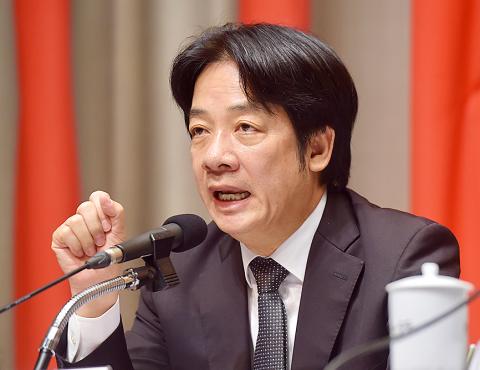Premier William Lai (賴清德) has lashed out at China for threatening to boycott Taiwan-based bakery cafe chain 85°C (85度C) after a California outlet allegedly gave President Tsai Ing-wen (蔡英文) a gift bag, comparing its behavior to a “blind swordsman randomly striking around” and said it was likely venting its frustration on Taiwan after the setbacks in its trade war with the US.
“Such behavior will not win society’s support,” Lai said in an interview that aired on Wednesday night on Chinese Television System.
“While in the US, the president passed by a store of a very successful local brand and went inside to buy a few cups of coffee to encourage the employees,” he said.

Photo: Huang Yao-cheng, Taipei Times
“China’s reaction to this natural act was grossly excessive,” the premier said. “China is like a blind swordsman randomly striking around.”
The interview came on the heels of a statement issued by 85°C on its simplified Chinese-language Web site, in which it declared its support for the so-called “1992 consensus” and the notion that “the two sides of the Taiwan Strait are one family” in an apparent attempt to pacify Beijing.
The “1992 consensus” refers to a tacit understanding between the Chinese Nationalist Party (KMT) and the Chinese Communist Party that both sides of the Taiwan Strait acknowledge there is “one China,” with each side having its own interpretation of what “China” means.
Some Chinese netizens have labeled the bakery chain, which has more than 1,000 branches worldwide, including in China, as a pro-Taiwanese independence business for receiving Tsai at a store in Los Angeles and threatened to boycott it.
China’s overreaction could be rooted in the pressure it was feeling from its trade war with Washington, Lai said.
That includes a ban on US government agencies using surveillance and telecommunications devices manufactured by a number of Chinese companies, in accordance with restrictions laid down in the US’ National Defense Authorization Act, which was signed into law by US President Donald Trump on Monday.
Citing as an example ZTE Corp (中興通訊), a Chinese telecommunications equipment manufacturer singled out by the act, Lai said: “What was touted as a major [Chinese] company and a multinational could not withstand a move from the US and had to close down.”
The incident made China “lose face,” Lai said, in reference to ZTE’s suspension of operations in the US in May after it was found to have breached US sanctions on Iran and North Korea.
“The company had to completely accept terms laid down by the US, including restructuring its board of directors, before it could resume operations [in the US], which came at a great cost,” he said.
“I think China is trying to take various opportunities to tell its people that it is indeed as strong as it claims to be, and during difficult times, especially when facing US pressure, it takes it out on Taiwan,” the premier said.
Lai also cited Beijing’s pressuring international airlines into changing the way they refer to Taiwan on their Web sites, which he said has sparked objections by other governments that it was meddling with their internal affairs.

US President Donald Trump yesterday announced sweeping "reciprocal tariffs" on US trading partners, including a 32 percent tax on goods from Taiwan that is set to take effect on Wednesday. At a Rose Garden event, Trump declared a 10 percent baseline tax on imports from all countries, with the White House saying it would take effect on Saturday. Countries with larger trade surpluses with the US would face higher duties beginning on Wednesday, including Taiwan (32 percent), China (34 percent), Japan (24 percent), South Korea (25 percent), Vietnam (46 percent) and Thailand (36 percent). Canada and Mexico, the two largest US trading

AIR SUPPORT: The Ministry of National Defense thanked the US for the delivery, adding that it was an indicator of the White House’s commitment to the Taiwan Relations Act Deputy Minister of National Defense Po Horng-huei (柏鴻輝) and Representative to the US Alexander Yui on Friday attended a delivery ceremony for the first of Taiwan’s long-awaited 66 F-16C/D Block 70 jets at a Lockheed Martin Corp factory in Greenville, South Carolina. “We are so proud to be the global home of the F-16 and to support Taiwan’s air defense capabilities,” US Representative William Timmons wrote on X, alongside a photograph of Taiwanese and US officials at the event. The F-16C/D Block 70 jets Taiwan ordered have the same capabilities as aircraft that had been upgraded to F-16Vs. The batch of Lockheed Martin

GRIDLOCK: The National Fire Agency’s Special Search and Rescue team is on standby to travel to the countries to help out with the rescue effort A powerful earthquake rocked Myanmar and neighboring Thailand yesterday, killing at least three people in Bangkok and burying dozens when a high-rise building under construction collapsed. Footage shared on social media from Myanmar’s second-largest city showed widespread destruction, raising fears that many were trapped under the rubble or killed. The magnitude 7.7 earthquake, with an epicenter near Mandalay in Myanmar, struck at midday and was followed by a strong magnitude 6.4 aftershock. The extent of death, injury and destruction — especially in Myanmar, which is embroiled in a civil war and where information is tightly controlled at the best of times —

China's military today said it began joint army, navy and rocket force exercises around Taiwan to "serve as a stern warning and powerful deterrent against Taiwanese independence," calling President William Lai (賴清德) a "parasite." The exercises come after Lai called Beijing a "foreign hostile force" last month. More than 10 Chinese military ships approached close to Taiwan's 24 nautical mile (44.4km) contiguous zone this morning and Taiwan sent its own warships to respond, two senior Taiwanese officials said. Taiwan has not yet detected any live fire by the Chinese military so far, one of the officials said. The drills took place after US Secretary